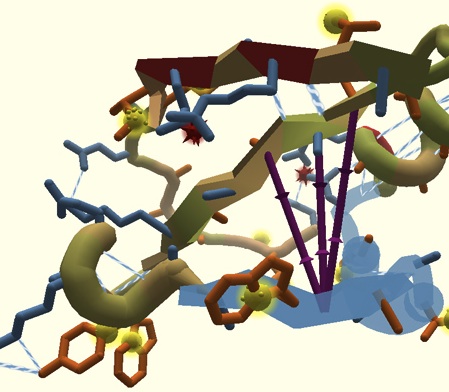Science Fiction
Dictionary
A B C D E F G H I J K L M N O P Q R S T U V W X Y Z
Gamers Outperform Algorithms At Competitive Protein Folding

Computer gamers outperform algorithms in figuring out how proteins select their final, three-dimensional shape given their unique DNA. Knowing the structure of a protein is essential in understanding how it functions and (more to the point from the researcher's standpoint) figuring out how to target it with drugs.
A small protein can consist of 100 amino acids, while some human proteins can be huge (1000 amino acids). The number of different ways even a small protein can fold is astronomical because there are so many degrees of freedom. Figuring out which of the many, many possible structures is the best one is regarded as one of the hardest problems in biology today and current methods take a lot of money and time, even for computers. Foldit attempts to predict the structure of a protein by taking advantage of humans' puzzle-solving intuitions and having people play competitively to fold the best proteins.
(From The Science Behind Foldit)

(Foldit Game screen)
Foldit uses some of the same conventions typical of other computer games, like a few simple structural problems to give new users a smooth learning curve. It also borrows from other online gaming communities; there are leaderboards, team and individual challenges, user forums, and so on.Though very few of those who played Foldit had any significant background in biochemistry, the gamers tended to beat Rosetta when it came to solving structures. In a series of ten challenges, they outperformed the algorithms on five and drew even on another three.
By tracing the actions of the best players, the authors were able to figure out how the humans' excellent pattern recognition abilities gave them an edge over the computer. For example, people were very good about detecting a hydrophobic amino acid when it stuck out from the protein's surface, instead of being buried internally, and they were willing to rearrange the structure's internals in order to tuck the offending amino acid back inside.
(From ars technica)
(Foldit video shows what competitive protein folding is all about)
SF movie fans recall Ender's Game, the 1985 novel that uses games as a medium in which children can solve real world problems. Continuing in the same vein, see a similar approach in World of Warcraft School of Business and this article on a MMOG For Military Training .
Scroll down for more stories in the same category. (Story submitted 8/4/2010)
Follow this kind of news @Technovelgy.| Email | RSS | Blog It | Stumble | del.icio.us | Digg | Reddit |
Would
you like to contribute a story tip?
It's easy:
Get the URL of the story, and the related sf author, and add
it here.
Comment/Join discussion ( 0 )
Related News Stories - (" Artificial Intelligence ")
Grok Scores Best In Psychological Tests
'Try to find out how he ticks...' - Isaac Asimov, 1941.
Google's Nano Banana Pro Presents Handwritten Math Solutions
'...copy was turned out in a charming and entirely feminine handwriting.' - Isaac Asimov (1949)
Woman Marries Computer, Vonnegut's Dream Comes True
'Men are made of protoplasm... Lasts forever.' - Kurt Vonnegut
ChatGPT Now Participates in Group Chats
'...the city was their laboratory in human psychology.'
Technovelgy (that's tech-novel-gee!) is devoted to the creative science inventions and ideas of sf authors. Look for the Invention Category that interests you, the Glossary, the Invention Timeline, or see what's New.
Science Fiction
Timeline
1600-1899
1900-1939
1940's 1950's
1960's 1970's
1980's 1990's
2000's 2010's
Current News
The New Habitable Zones Include Asimov's Ribbon Worlds
'...there's a narrow belt where the climate is moderate.'
Can One Robot Do Many Tasks?
'... with the Master-operator all you have to do is push one! A remarkable achievement!'
Atlas Robot Makes Uncomfortable Movements
'Not like me. A T-1000, advanced prototype. A mimetic poly-alloy. Liquid metal.'
Boring Company Drills Asimov's Single Vehicle Tunnels
'It was riddled with holes that were the mouths of tunnels.'
Humanoid Robots Tickle The Ivories
'The massive feet working the pedals, arms and hands flashing and glinting...'
A Remarkable Coincidence
'There is a philosophical problem of some difficulty here...'
Cortex 1 - Today A Warehouse, Tomorrow A Calculator Planet
'There were cubic miles of it, and it glistened like a silvery Christmas tree...'
Perching Ambush Drones
'On the chest of drawers something was perched.'
Leader-Follower Autonomous Vehicle Technology
'Jason had been guiding the caravan of cars as usual...'
Golf Ball Test Robot Wears Them Out
"The robot solemnly hit a ball against the wall, picked it up and teed it, hit it again, over and again...'
Boring Company Vegas Loop Like Asimov Said
'There was a wall ahead... It was riddled with holes that were the mouths of tunnels.'
Rigid Metallic Clothing From Science Fiction To You
'...support the interior human structure against Jupiterís pull.'
Is The Seattle Ultrasonics C-200 A Heinlein Vibroblade?
'It ain't a vibroblade. It's steel. Messy.'
Roborock Saros Z70 Is A Robot Vacuum With An Arm
'Anything larger than a BB shot it picked up and placed in a tray...'
A Beautiful Visualization Of Compact Food
'The German chemists have discovered how to supply the needed elements in compact, undiluted form...'
Bone-Building Drug Evenity Approved
'Compounds devised by the biochemists for the rapid building of bone...'
